Earth Day’s 45th anniversary could be the most exciting year in environmental history. The year in which economic growth and sustainability join hands. It’s our turn to lead. So our world leaders can follow by example. I have very excited … Continue reading
Add a CommentViewing: Blog Posts Tagged with: Sequoia, Most Recent at Top [Help]
Results 1 - 5 of 5
Blog: Miss Marple's Musings (Login to Add to MyJacketFlap)
JacketFlap tags: Animals Endangered, Multi Cultural, galapagos george, Edmund Pickle Chin a Donkey Rescue Story, A Grand Old Tree, Marcie Coleen, EARTH DAY 2015, Cathleen Burnham, child activists, Doyli to the Rescue: Saving Baby Monkeys in the Amazon, Life in the Ocean, Parker Pastures, The Last Polar Bear, WAKA, ways to celebrate earth day with kids, Why Are The Ice Caps Melting?, children's books, nonfiction, Inspiration, education, bees, Book recommendation, conservation, Sequoia, deforestation, Earth Day, teacher's guide, endangered species, roots and shoots, animal rescue, Jane Goodall, Compost Stew, Add a tag
Blog: Miss Marple's Musings (Login to Add to MyJacketFlap)
JacketFlap tags: teaching resources, tony johnston, redwoods, wendell minor, Perfect Picture Book Friday, roaring lion press, picture books, Sequoia, Add a tag
This is the fifth picture book illustrated by Wendell Minor that I have reviewed! It has just recently been published and I thought it would be a great follow-on from last week’s review on A GRAND OLD TREE. It is, after … Continue reading
Add a CommentBlog: Bottom Shelf Books (Login to Add to MyJacketFlap)
JacketFlap tags: Wild Animal Kingdom, That Many Splendored Thing, Fun with Food, Wild Animal Kingdom, Fun with Food, That Many Splendored Thing, Add a tag
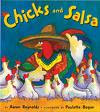
Author: Neil Numberman
Illustrator: Paulette Bogan
This is a silly story about chickens who are bored of eating the normal barnyard fare and look to spice things up a little bit. Coincidentally, this is also the name of the survival manual for graduating fraternity brothers titled Chicks and Salsa: How to Score with the Ladies in the Big City.
As you'll see in the following excerpt, there are some surprising similarities between the two books.
(Disclaimer: the views expressed in the excerpt below do not necessarily reflect those of the Bottom Shelf.)
RULE #1: LEARN TO SALSA
by Brother Shoehorn (Sigma Alpha Pi) and Brother Moosedroppings (Omega Delta Delta)
Trust us bro. We know you're gonna to feel silly swinging your hips around the dance floor. We know you'd rather be bangin' your backwards baseball cap to some Dave Matthews or the Beastie Boys (who f****in rule!). But trust us dude, it will be well worth your time.
Once you find yourself in the city and away from the comfort of your boys on frat row, you will inevitably find yourself in a club with latin music of some sort. There you will see all kind of bizarre things. You'll see the oldest man there dancing with the blazinest chick in the club. Or worse, some four-eyed doofus pulling a Kucinich* and sashaying across the floor with some hottie. You will ask yourself, "What the?! What is going on here? Have I entered some kind of twilight zone where generic good looks, trust funds, and chugging ability mean nothing anymore?!"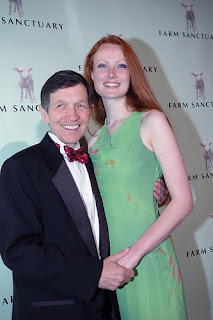
*Pulling a Kucinich: Being with someone who is obviously waaaaaaaaay out of your league.
Don't panic. No need to get your Dockers in a bunch. What's happening is what we like to call the Chicks and Salsa Phenomenon. (Inside Tip: Now that you're in the real world, don't call them chicks. You have to call them "ladies" if you want to get anywhere)... anyways, the problem is that these ladies are in the city and they want to spice up their lives a little bit. Which means that they'll dance with any goof who knows how to salsa. They're tired of the tried and true bars where we are most comfortable. Those home-away-from-homes where we can do boat races or clear off a table for an impromptu game of beer pong. Those bars where we can comfortably stand in one place rhythmically nodding our heads to some righteous tunes.
So, if you know what's good for you... wait, hold on a sec, what are you doing still reading? Reading is for losers! Take our word for it and go sign up for a salsa class now! It will make you a man amongst bros. You can be that dude that's dancing with a chick--i mean, lady--who is out of your league. And don't worry, the salsa only needs to be used for the first month of dating or so, then you can go back to being your awesome fratastic self. Now close this book and get back out there! With any luck, even you can pull a Kucinich of your own!
Blog: Bottom Shelf Books (Login to Add to MyJacketFlap)
JacketFlap tags: Wild Animal Kingdom, Aalphabetical: F, Fun with Food, Aalphabetical: R, Add a tag
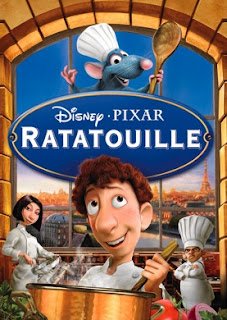
Given the intensity of today's DVD Special Features, it's no surprise that we never get to them all. And to be honest, as enlightening as the Director's Commentary may be, most people rarely take the time to sit through it. So, as a special service, I've transcribed a portion of the Director's Commentary from the Limited Collector's Edition of Ratatouille that I thought you'd find particularly enlightening. Enjoy!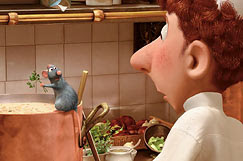
Scene: Remy Cooks the Soup
Time: 00:23:32 - 00:34:46
Commentary by: Brad Bird (Director, Writer) and John Lasseter (Executive Producer)
Bird: This might be my favorite scene. It really gets to the epitomizes one of the driving forces behind the plot, and that is the transcendent nature of art. How one can just get swept up in the divine process of creation, whether it be cooking, painting, or animating. Here Remy delays his escape, literally putting his life on the line, in order to satisfy his artistic impulse. It's really quite beautiful.
Lasseter: I couldn't agree more. As artists, we all know that risk is an essential component to all great art. Without risk, there is no reward.
Bird: And this project in and of itself was a huge risk. I mean, the idea of creating an entire movie around a rat in the kitchen... and cooking no less! You don't know how many people thought we were totally nuts. Though to be honest, we weren't exactly treading new ground here. Rodents have been at the heart of children's entertainment for generations.
Lasseter: And because of the Disney connection, people always assume that Remy was a descendent of Mickey Mouse...
Bird: Yeah, that's the first thing people always ask me. But, to be honest, while I was putting the script together, I didn't consider Mickey to be a good role model for the Remy character. For me, as great as Mickey was, he was always a creation… never the creator. He was the product of Walt Disney's imagination, but the character himself lacked imagination… I always found him to be kind of bland... the likeable straight man in a world of fantastically complex characters. To find a suitable ancestor for Remy, I had to draw upon a character who felt the same creative impulse. I found just the guy in another beloved rodent: Leo Lionni’s Frederick.
Lasseter: When Brad told me this, I nearly fell out of my chair, because Frederick was one of my childhood favorites. You all know the story, a band of mice prepares for the harsh winter, but one of them, Frederick, collects words and colors instead of food. At first, everyone thinks he's lazy, but when winter comes and they are out of food, Frederick's artistic vision inspires them and keeps them warm for the duration of the summer. Inspiration and imagination warms the body and soul and the power of art triumphs over circumstance.
Bird: Right.... so as you can see, Remy and Frederick have a lot in common. They really are cut from the same cloth. They both start out as outcasts because of their artistic tendencies. They both want to elevate themselves from the mundane through their art. However, I was always a little bothered by Frederick because I kept thinking, couldn't he have collected words and colors while lending a hand? I mean, there had to be some kind of balance between indulging in your art and the basic necessity of gathering food. I couldn't shake the feeling that despite his triumph at the end, he was still kind of a freeloader.
Lasseter: Brad, I never thought I'd say this, but you're starting to sound like a Republican.
Bird: Stop it. You know what I mean. Yes, art is important, but so is sustaining one's livelihood. I mean, hadn't Frederick ever heard of Maslow's Hierarchy of Needs?!
Lasseter: Brad, you're digressing again. Let's get back on track, or we'll have to cut this from the final DVD.
Bird: Right. So, in order reconcile the basic need for food and the transcendent need for art, I had the brilliant idea to make food his art! It was quite an elegant solution, if I do say so myself.
Lasseter: Plus, with the current pop culture obsession with the culinary arts, food made the movie very marketable. I mean just look at the popularity of the Food Network, Top Chef, Iron Chef, Swedish Chef, etc. This was an idea that came at the perfect time. But that's the producer in me talking.
Bird: Yeah, the producer in you also forced me to put in that ill-conceived romance between Linguini and Collete. That one still stings... I mean, who in their right mind would believe that the tough-as-nails Collete would ever fall in love with the hapless Linguini? Suspension of disbelief can only take the audience so far.
Lasseter: Yeah, yeah, I didn't hear you complaining when Ratatouille was sitting at the top of the box officeas the checks were rolling in. I know the movie industry and I know our audience. People want some love sprinkled into every story... it's like putting hot sauce on your burrito, it just spices it up a bit.
Bird: Now who's digressing? Back to my point, if you take Frederick and compare it to Ratatouille, you'll start to see more parallels. The scene where Remy helps his cousin Emile visualize taste pays homage to the scene where he Frederick helps his friends visualize the colors of spring. And instead winter, I chose to embody the impending threat of death in the chilly and crypt-like character of the food critic, Anton Ego.
Lasseter: And as all us in the entertainment business know, a critic's chilly reception is much deadlier than the coldest winter.
Bird: Yeah, luckily, we haven't had to deal with much of that because we only make awesome movies.
Lasseter: Yeah, we rock.
Bird: But just like Frederick's art triumphs over winter, Remy's art melts the heart of Anton Ego and his perpetual winter of discontent. And in both the book and the film, the skeptical peers find inspiration in the wake of their talented friend/son. Oh, and even the name Linguini pays homage to the great children's author... I wonder if the audience caught that. Lin-gui-ni, Li-o-nni...
Lasseter: I didn't even catch that until now!
Bird: I know, cool isn't it? High five!
[Bird and Lasseter "high five".]
Bird: Ooo! Ooo! This next scene is great too, where Linguini and Remy first communicate down by the river. There are just so many layers of complexity embedded in their interaction. To really increase the tension, I incorporated aspects of Freud's Theories of Externalization as well as the Jungian Conception of Synchronicity...
Lasseter: Oh wait--did you hear that?
Bird: Hear what?
Lasseter: That sound... I think... I think it's the sound of our audience falling asleep.
Bird: Or... maybe... it's the sound of me feeding you a knuckle sandwich!
Lasseter: Bring it on, Birdman!
Bird: You asked for it... I hope you're hungry!
---end of transcript---
Blog: Bottom Shelf Books (Login to Add to MyJacketFlap)
JacketFlap tags: Old School Classics, Aalphabetical: S, Caldecool Award Winners, Fun with Food, Add a tag
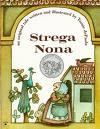
Author/Illustrator: Tomie dePaola
This is dePaola's classic story that revolves around an old woman and her wonderful pot. (No, it's not about Courtney Love). Strega Nona is the village medicine woman who has a magic pot that, when the right words are spoken, produces pasta. To stop the pot, she recites another spell... and blows three kisses.
Her goofball of an apprentice (Big Anthony) jealously watches Strega Nona casting her spell over the pot, but misses the 3 kisses part. This lack of attention to detail soon leads to some Sorcerer's Apprentice-like mayhem (Note: the Sorcerer's Apprentice was not originally written by Walt Disney).
One day, Strega Nona goes out of town and leaves Big Anthony in charge. Of course, he goes out and tells everyone about the magic pot and then casts the spell, unleashing the magical pasta producing power of the pot and curing everyone's case of the munchies. Big Anthony is the man of the hour!
Unfortunately, Big Anthony doesn't know how to properly shut down the pot and it begins to boil over. A dangerous wave of noodles threatens to bury the entire village. Now everyone hates Big Anthony. That's life in the public eye for you. One minute you're on top of the world, the next minute you're being chased by an angry mob and thrown into a jail cell with Lindsay Lohan.
In the mid 80's, a community theater in Woodstock, Vermont gained national attention for their politically charged interpretation of dePaola's story. Critics flocked to this tiny hippie hamlet to see the play, which had re-imagined the story as a parable about the prevalent economic policy of the times: Reaganomics. The play was called Streganomics.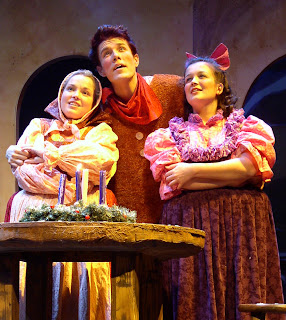
Left: A scene from Streganomics with Scott Robinski (middle) playing the Reagan-inspired character of Big Anthony, a generically handsome but bumbling doofus.
In the play, the director compares Big Anthony's short-sighted attempt to wield the power of the magic pot to the conservative party's unwaverying belief in the power of the free market. (In a particularly brutal pun, the directors replaced trickle-down economics with boil-over kitchenomics. There's a reason you've never heard of this play.)
Just as the pasta pot dangerously boils over, the U.S. economy eventually spins out of control. The economy takes on a life of its own and ushers in an era of unparrelled economic stratification. People always seem to overlook the fact that the market does not have a moral compass built in. Therefore, it should not be relied upon to magically set our social guidelines. The market must be regulated to some extent in order for it to reflect the morals of our society.
Just like Magic, Capitalism isn't inherently evil (as some zealots will tell you), but it's not inherently good either, and therefore its power must be wielded with wisdom and restraint... two qualities of which many politicians (on both sides of the aisle) are notoriously lacking.
In the book, Strega Nona returns to find the city under seige by pasta. She utters the magic words and blows the three kisses to bring the starchy surge to a halt. In the play, however, all does not end so well... Strega Nona doesn't come back.
The play casts Strega Nona as an exalted FDR figure, and her magic of containment is meant to represent the wisdom of the New Deal. However, just as the egalitarian principles behind the New Deal seem like a distant memory, Strega Nona's unique ability to put a lid on the magic pot is lost forever and it appears that the rising tide of pasta is irreversible.
Several people take the helm from Big Anthony, but no one has the courage to utter the magic words that might stem the tide... words such as, "progressive tax code," or "increased corporate regulation." The curtain drops with the citizens of the town buried under a sea of pasta and Big Anthony being airlifted by a private jet and flown off into the sunset. Note: In the widely overlooked sequel, Strega Nona Meets Her Match, a mysterious stranger appears with a magic fondue pot. Lightning strikes and the two instantly fall head over heels in love. They join forces and with their two magical pots create an unending supply of Macaroni and Cheese, transforming their village into heaven on earth. Now THAT is what I call a happy ending.
Note: In the widely overlooked sequel, Strega Nona Meets Her Match, a mysterious stranger appears with a magic fondue pot. Lightning strikes and the two instantly fall head over heels in love. They join forces and with their two magical pots create an unending supply of Macaroni and Cheese, transforming their village into heaven on earth. Now THAT is what I call a happy ending.





This was too funny. I just bought Ratatouille for the kids, and they were getting a bit annoyed with my comments while we were watching this. I really enjoyed the movie. But your post...too funny.
Delicious. And trying not to sound greedy here, but how about MORE? From other movies, I mean. You know you can.
HEEE!
You know, I kind of hated this movie, so this does me good...
I'm glad you liked the post. and Sarah, I'll definitely check and see if i can see any other hidden special features in my DVD collection.
though, to be clear, I really liked this movie... and have seen it more times than any grown man without kids should admit to.